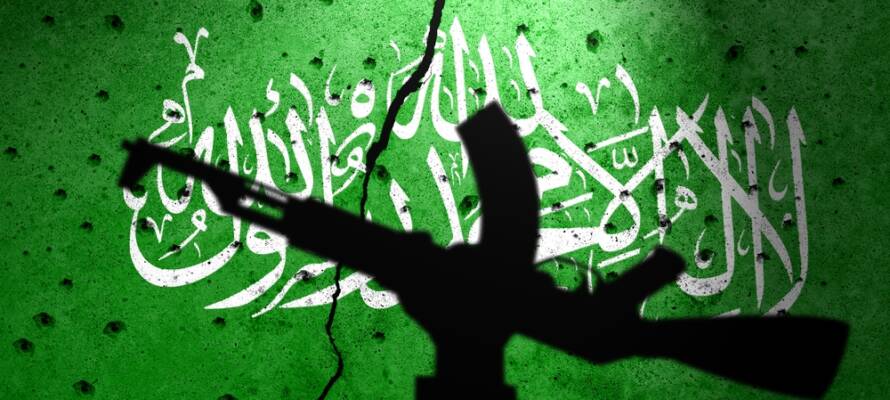Hamas’ chief ideological document, its 1988 charter, calls for the ‘struggle against the Jews with all means and methods.’
By Chaim Lax, The Algemeiner
Studying battles, territorial gains and losses, or the impact on those directly affected by the violence in a war is not enough for a full understanding of a conflict. It’s also necessary to examine the belligerents’ ideological roots, and their founding documents and doctrines, in order to weigh the justice (or injustice) of each side’s cause.
For example, when studying the American Civil War, a comparative analysis of the United States of America and the Confederate States of America’s constitutions and declarations of independence/secession clearly shows the values that each side held and how it influenced their war aims and conduct.
So, too, with the current war between Israel and Hamas, to fully understand the conflict, it is important to examine the differences in both the ideological underpinnings and battle ethics of the Israeli military and the Gaza-based terror group.
It becomes clear that this war is an asymmetric battle between a military force that places a premium on life and human dignity and an organization that finds all human lives expendable in its eternal fight against the Jewish state.
Purity of Arms: The Israeli Battle Ethic
The IDF’s battle ethic, commonly referred to as “purity of arms,” traces back to before the creation of the State of Israel, when the Jewish community took up arms against marauding insurgents during the Great Arab Revolt in the late 1930s.
Following the creation of the state and the establishment of the Israel Defense Forces, Israel’s military ethic integrated the purity of arms doctrine (the use of arms in order to fulfill the mission and to use only when necessary) with the norms established by international law.
In the 1990s, this ethic became enshrined in The Spirit of the IDF, which explicitly laid out the Israeli army’s guiding moral principles and values.
According to this code, one of the core values espoused by the IDF is human dignity, which holds that “every individual is of inherent value, regardless of their ethnicity, religion, nationality, gender or status.”
Arising from this core value is the value of purity of arms, which states, in part, that “The soldier will not use their weapon or power to harm uninvolved civilians and prisoners and will do everything in their power to prevent harm to their lives, bodies, dignity, and property.”
Commensurate with these values is one of the IDF’s chief principles: “The IDF serviceman will treat enemy troops and civilians in areas controlled by the IDF in accordance with the letter and spirit of the laws of war and will not exceed the limits of his authority.”
These basic moral values and principles have been upheld by the IDF’s leadership and have served as the basis for reprimands by the army’s command when soldiers have acted outside the parameters set by the code of ethics.
Even today, as Israel battles Hamas terrorists who have embedded themselves among Gaza’s civilian population, the IDF’s code of ethics guides it as it aims to damage Hamas’ terror network while also trying to reduce the number of civilian casualties.
As John Spencer, an American military veteran and the chair of urban warfare studies at the Modern War Institute at West Point, recently wrote, “Israel has taken more measures to avoid needless civilian harm than virtually any other nation that’s fought an urban war.”
Hamas’ Doctrine of Indiscriminate Cruelty & Barbarism
To understand Hamas’ battle ethics, one of the key documents is The Warrior’s Guide: Jihadi Version, an eight-page booklet that was recovered from the body of a dead terrorist following Hamas’ barbaric October 7 invasion of southern Israel.
This manual, which was first brought to light by Israeli President Isaac Herzog during a CNN interview, contained a detailed chart on the IDF’s hierarchy, in-depth analysis of the Israeli military’s arms and technology, as well as step-by-step instructions for taking Israeli hostages.
Included in the nine-step process were directions on how to assert control over the captives using threats, electric shocks, gunfire, and incapacitating grenades, the killing of hostages when necessary, and the use of hostages as human shields, regardless of their gender, age, or ethnic identity.
This barbaric guide is rooted in Hamas’ chief ideological documents, its 1988 charter which calls for a “struggle against the Jews,” and its 2017 declaration of General Principles and Policies, which asserts that resistance against Israel “with all means and methods is a legitimate right guaranteed by divine laws and by international norms and laws” (emphasis added).
Thus, between Israel’s efforts to reduce civilian casualties and Hamas’ flagrant use of both Israeli and Palestinian civilians as pawns for their own nefarious purposes, it is clear that the values imparted by the IDF’s and Hamas’ texts are being fully expressed by each side on the battlefield.
